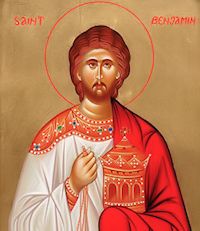Lent: March 31st
Thursday of the Fourth Week of Lent
Other Commemorations: St. Benjamin, Deacon and Martyr (RM)
» Enjoy our Liturgical Seasons series of e-books!
Communion Antiphon, Jer 31:33:
I will place my law within them and I will write it upon their hearts; and I will be their God, and they shall be my people, says the Lord.
More than any other Gospel, John gives us an insight into the suffering soul of Jesus. Today we have the “Moses Mass.” In it both readings speak of that great Prophet and Deliverer of the people. And we note how the plot against the Lord’s life is thickening. Moses is a type of Christ—the interceding suffering Mediator for God’s people. —The Vatican II Weekday Missal
The Roman Martyrology commemorates today St. Benjamin, a martyr of Persia (modern Iran) and a deacon in the persecution conducted by the Sassanid rulers Yazdigerd I and his son Varahran. He was tortured and impaled.
Meditation—Christ’s Sacrifice on Calvary
The first reading of to-day’s Mass relates the intercession of Moses before Yahweh so that He should not punish his People’s infidelity. He invokes moving reasons: the good name of the Lord among the Gentiles, the faithfulness of his People to the Covenant made to Abraham and his descendants… And, in spite of their infidelities and the inconstancy of the chosen People, God forgives once more. Moreover, God’s love for his People, and through his People for the whole human race, will yet reach its supreme manifestation: For God so loved the world that he gave his only Son, that whosoever believes in him should not perish, but have eternal life.
Christ’s total self-surrender on our behalf, which reaches its culmination on Calvary, is an urgent call to us to correspond to his great love for each one of us. On the Cross, Jesus consummated his total self-surrender to his Father’s will, and showed his love for all men, for each and every person. He…loved me and gave himself for me. Faced with this unfathomable mystery of Love, I should ask myself, what do I do for him? How do I correspond to his love?
On Calvary, Our Lord, Priest and Victim, offered himself to his heavenly Father, shedding his blood, which became separated from his Body. This is how he carried out his Father’s will to the very end.
It was the Father’s will that the Redemption should be carried out in this way. Jesus accepts it lovingly and with perfect submission. This internal offering of himself is the essence of his Sacrifice. It is his loving submission, without limits, to his Father’s will.
In every true sacrifice there are four essential elements: and all of them are present in the sacrifice of the Cross: priest, victim, internal offering and external manifestation of the sacrifice. The external manifestation must be an expression of one’s interior attitude. Jesus dies on the Cross, externally manifesting (through his words and his deeds) his loving internal surrender. Father, into thy hands I comment my spirit! I have finished the task you committed to me, I have fulfilled your Will. He is, both then and now, at once Priest and Victim. Since, then, we have a great high priest who has passed through the heavens, Jesus, the Son of God, let us hold fast our confession. For we have not a high priest who is unable to sympathise with our weaknesses, but one who in every respect has been tempted as we are, yet without sinning.
The internal offering of Jesus gives full meaning to all the external elements of his voluntary sacrifice—the insults, the stripping of his garments, the crucifixion.
The Sacrifice of the Cross is a single sacrifice. Priest and Victim are one and the same divine person: the Son of God made man. Jesus was not offered up to the Father by Pilate or by Caiphas, or by the crowds surging at his feet. It was He who surrendered himself. At every moment of his life on earth Jesus lived a perfect identification with his Father’s will, but it is on Calvary that the Son’s self-surrender reaches its supreme expression.
We, who want to imitate Jesus, who want only that our life should be a reflection of his, must ask ourselves to-day in our prayer: do we know how to unite ourselves to Jesus’ offering to the Father and accept God’s will at every moment? Do we unite ourselves to him in our joys and our sorrows and in all the activities that make up each one of our days? Do we unite ourselves to him at the more difficult times, such as moments of failure, pain or illness, and at the easy times, when we feel our souls filled with joy?
My Mother and Lady, teach me how to pronounce a ‘yes,” which, like yours, will identify with the cry Jesus made before his Father: non mea voluntas…. (Luke 22:42)…not my will but God’s be done.
—Francis Fernandez, In Conversation with God
St. Benjamin
 The Christians in Persia had enjoyed twelve years of peace during the reign of Isdegerd, son of Sapor III, when in 420 it was disturbed by the indiscreet zeal of Abdas, a Christian Bishop who burned the Temple of Fire, the great sanctuary of the Persians. King Isdegerd threatened to destroy all the churches of the Christians unless the Bishop would rebuild it.
The Christians in Persia had enjoyed twelve years of peace during the reign of Isdegerd, son of Sapor III, when in 420 it was disturbed by the indiscreet zeal of Abdas, a Christian Bishop who burned the Temple of Fire, the great sanctuary of the Persians. King Isdegerd threatened to destroy all the churches of the Christians unless the Bishop would rebuild it.
As Abdas refused to comply, the threat was executed: the churches were demolished, Abdas himself was put to death, and a general persecution began which lasted forty years. Isdegerd died in 421, but his son and successor, Varanes, carried on the persecution with great fury. The Christians were submitted to the most cruel tortures.
Among those who suffered was St. Benjamin, a Deacon, who had been imprisoned a year for his Faith. At the end of this period, an ambassador of the Emperor of Constantinople obtained his release on condition that he would never speak to any of the courtiers about religion.
St. Benjamin, however, declared it was his duty to preach Christ and that he could not be silent. Although he had been liberated on the agreement made with the ambassador and the Persian authorities, he would not acquiesce in it, and neglected no opportunity of preaching. He was again apprehended and brought before the king. The tyrant ordered that reeds should be thrust in between his nails and his flesh and into all the tenderest parts of his body and then withdrawn. After this torture had been repeated several times, a knotted stake was inserted into his bowels to rend and tear him. The martyr expired in the most terrible agony about the year 424.
—Excerpted from Saints and Angels
Highlights and Things to Do:
- Read more about St. Benjamin:
- If you are named after St. Benjamin you can find a medal of him at the Catholic Company.
- St. Benjamin is also honored in the Eastern Orthodox Church and the Byzantine Rite Eastern Catholic Churches on October 13.






